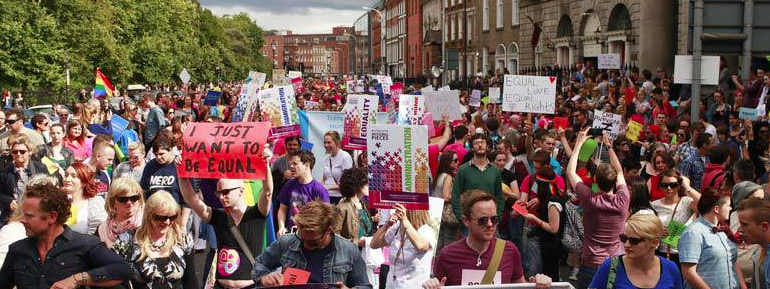2013 was a year of monumental progress for LGBT people in Ireland across a wide range of areas. In a twenty year period, Ireland has moved from being one of the most inhospitable countries for LGBT, to being one of the most progressive in the world.
“This year, 2013, has marked 20 years of phenomenal progress for lesbian and gay people in Ireland. The transformation from being treated as criminals in 1993, to a step from full constitutional equality by 2013 is remarkable. All Irish people should take pride in these achievements”, commented Kieran Rose, Chair of Gay and Lesbian Equality Network.
Marriage and Families
A major highlight of the year was the overwhelming result at April’s Constitutional Convention which recommended by a huge margin that the Government holds a referendum on access to civil marriage for lesbian and gay couples, a decision accepted by the Government.
“The Government’s historic decision in November to hold a referendum on equal access to marriage in 2015 was a landmark moment in the evolution of equality for lesbian and gay people. The Taoiseach’s support for the move means that the leaders of all political parties now support constitutional change to provide for marriage for gay couples. This unanimous support is still relatively rare across the world” said Rose.
At the same cabinet meeting, the Government decided to prioritise legislation that will remove legal inequalities for many families, including lesbian and gay families. “We look forward to 2014 being the year that equality of rights and responsibilities is introduced for lesbian and gay families and their children” said Rose.
“Almost 1,500 couples have entered civil partnerships by the end of 2013. These couples, with their public celebrations of their love and commitment, are pioneers in helping Ireland rapidly evolve to support equal access to marriage and full constitutional equality for lesbian and gay couples” continued Rose.
School Protections for LGBT Students
Another transformative development in 2013 was the Anti-Bullying Procedures for schools produced by the Department of Education, and launched in September by Minister for Education Ruairí Quinn TD, who has made a strong commitment to ‘eliminate homophobic bullying’. The new procedures fully incorporate measures to tackle and prevent homophobic and transphobic bullying.
“These new anti-bullying procedures, applying to both primary and secondary schools, lay the groundwork for a major shift in how schools deal with bullying in general and, in particular, bullying because a person is or is perceived to be LGBT” said Rose.
“The commitment by Minister Quinn, the Department of Education and the Education partners to ensure that LGBT young people are safe, supported and affirmed in our schools is a critical step in ensuring that the next generation of LGBT young people can participate in school on the same basis as other young people” said Rose.
Workplace
Another key area where LGBT people experience harassment and exclusion is the workplace. 2013 saw the rollout of the GLEN Diversity Champions programme, which supports private and public sector employers in ensuring full and equal participation in the workplace by their LGBT staff. 12 companies joined the programme in 2013, including the Irish Prison Service.
Minister for Justice Alan Shatter commented at the time “I have no doubt that today’s launch will provide courage to other LGBT staff members, both in the Prison Service and across all areas of employment, who may still feel under pressure to conceal their true personality when doing their job.”
Rural Isolation
Many LGBT people who live in rural Ireland may experience isolation because of the lack of support networks or organisations in their areas. In a landmark development, Macra na Feirme and GLEN produced a support guide for LGBT people in rural Ireland which was launched at the National Ploughing Championships by Minister for Agriculture, Simon Coveney.
“This was the first time a gay organisation attended Ireland’s biggest farming event. The welcome was wonderful and many thousands of visitors came to the GLEN stand. Working in cooperation with rural organisations like Macra na Feirme is a key way of delivering progress to LGBT people right across Ireland” said Rose.
2014…
“While we have further progress to make in many areas, including in public safety and promotion of positive mental health, 2013 saw Ireland move ever closer to our goal – that lesbian and gay people can fully and equally participate in all aspects of Irish society” said Rose.
“We would like to express our thanks to the Fine Gael/Labour Government, all Political Parties, Independent TDs and Senators, public servants, professional bodies, employers and civic society organisations who have all played critically important roles in delivering on this great progress. We will continue to work with all agents of change to ensure full participation for LGBT people in all aspects of Irish society” said Rose.
“We look forward to 2014 and 2015 with a confidence that Irish people will support further progress towards full equality for lesbian and gay people with the generosity and sense of fairness that has marked all the progress already achieved” concluded Rose.
A Contribution from GLEN.
Photo by Brian Hanlon.
© 2014 GCN (Gay Community News). All rights reserved.
